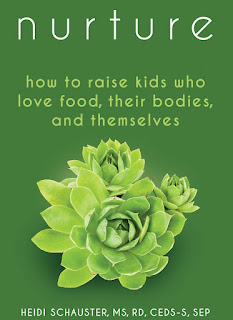"Nurture" by Heidi Schauster
185 pages; Published by Hummingbird Press, ©2024
In a world where many people seem to seem obsessed with their body and try to address “problems” with cutting back or changing what they eat, Heidi Schauster offers different methods and a different perspective when it comes to facing these problems.
Schauster has addressed multiple issues and potential solutions in “Nurture: How to Raise Kids who Love Food, their Bodies, and themselves”. In the book, she offers ten steps to address potential eating disorders and offers alternatives to "solutions" people have previously utilized to manage their weight and their appetite.
"Nurture" takes on not only eating disorders that affect adults and teenagers, especially women, but also the body image issues that cause these disorders. Schauster not only cites the problems that can lead to disorders (stress, body image, and genetics, just to name a few) and offers many solutions to the food-related issues. As a licensed professional, Schauster stresses that it is not wise to always go at it alone and to seek a support system and, when necessary, professional counseling.
Schauster's book looks at "Charged Foods" and foods that are labelled as "special" or a reward. This will associate a label with the food for the children. "Charged Foods", in the book are foods that could be labelled as "bad" and associating it with guilt for eating it or calling something "special", which may entice a child to eat it when parents aren't looking because it has the label of being special. Another concept that is practiced by Schauster herself is putting dessert on the table during dinner. Doing this makes the dessert a part of the meal instead of an "extra food" or a treat for finishing the meal. If the dessert is presented as a component of mealtime, people will be reminded that it is there as the "next course" and pace themselves during mealtime.
 |
| Heidi Schauster (Photo: Smith Publicity) |
There is also the idea mouth hunger vs stomach hunger. This could also be labelled as "the eyes being bigger than the stomach". If something tasted good, a person will eat more of it, even if they are feeling full. Identifying the stomach getting full despite the mouth wanting more is also a way of regulating the food one eats.
"Nurture also shows what five elements should be present at most meals and the benefits of moving for fun instead of appeasing a device. Schauster encourages being active as a family and how people can work together to hold themselves accountable when it comes to a healthy amount of exercise. Parents can monitor their children for the first 20 years of their lives, according to Schauster and her book. She offers her opinions on the best ways to monitor the children and make sure what and how they are eating is offering optimal nutrition.




Comments
Post a Comment